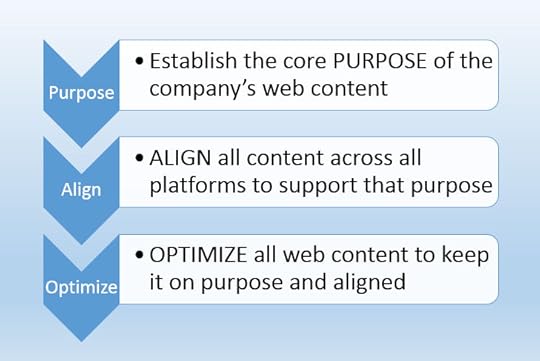Nick Usborne's Blog, page 17
August 8, 2016
Selling is giving way to storytelling. Are you ready?
 I have seen a lot of changes over the course of my career as a copywriter.
I have seen a lot of changes over the course of my career as a copywriter.
Back in 1979, when I got started, I wrote my copy on lined paper, with a pen. Then a secretary typed it up using one of those trendy new IBM “golf ball” typewriters.
By 1985 I was working on an Apple Macintosh computer, saving my files to those huge floppy discs.
Fast forward to 1995, when I wrote and published my first website. I fell in love with writing for the web from day one.
Over those first 15 or so years of my career, my job was the same. My job was to sell with words. I was a copywriter, plain and simple. I wrote sales copy.
Back then, copywriting was all about selling “at” your audience, because offline media don’t allow for much in the way of reciprocity. Companies used TV to get their commercials in front of an audience, but the audience couldn’t use TV to talk back to those companies. Or to each other.
Little by little, the web changed that one-way dynamic. First through bulletin boards, then through forums and comment streams… and finally, through social media.
Today, billions of people around the world are communicating through social apps on their mobile devices.
The copywriting paradigm of the 1980’s has finally been cracked, broken, crushed and changed.
You can no longer simply write hard-selling copy at a passive audience.
Your online audience is not passive. Quite the reverse.
They can talk back. They can talk among themselves.
And they can “turn off” your advertising any time they want.
If people find a company’s emails too salesy or pushy, they’ll unsubscribe or mark those emails as spam.
If people get fed up with all the ads that litter their favorite news, sports and entertainment websites, they’ll install an adblocker.
It is estimated that by 2020 over $12 billion worth of ads will have been blocked with adblockers.
And fewer and fewer people will sit still while you serve up one of your long, traditional, one-way sales pitches.
People have better things to so… like keeping up with their friends online, watching a short video, or creating and publishing a video of their own.
Today’s customers are not passive, sitting at home waiting for your next sales message to hit. They are writers, creators and makers. Truly. Anyone who is active on Facebook, Instagram, Snapchat or any other social channel is a maker and a creator.
They have neither the time nor the patience for your blah blah sales message.
So… if sales copy is losing its bite… what’s the answer?
How can you get the attention of your prospects?
How can you hold that attention, deepen your relationships with those prospects, and then convert them into loyal customers?
And once they become customers, how do you keep them?
The answer is simple.
Tell stories.
Stories about your company, or your clients’ companies.
Stories about your products.
Stories about your customers.
It turns out that stories are a great way to get into the minds and hearts of your audience.
Better still, while the modern, social web becomes less and less hospitable to traditional, hard-sell sales copy, it is a natural and nurturing environment for storytellers.
The web loves stories. And social media really, really loves stories.
If you are a content writer, web copywriter or online marketer, you should immerse yourself in the craft of selling with stories.
More on this – and plenty of examples – in my next post…
BTW – If you think you might be interested in my upcoming course – Selling with Stories – reach out to me through my Contact page and type “I love stories” in the message field. You’ll then hear about the course “pre-launch”, and you’ll get a special, extra discount on the price!

If you found this post helpful, sign up for my e-newsletter and get a free copy of my 35-page guide…
Writing For The Web #1 — 7 Challenges every Writer and Copywriter faces when writing for the Web.
Sign up and I’ll send you the link for the download, and then you’ll receive my most recent post as part of my e-newsletter every Tuesday morning.
Sign Up for my Excess Voice Newsletter…
Name:
Email:
0 subscribers
We respect your privacy
Email Marketing by GetResponse
(Your email address will be used only for the purpose of sending you this newsletter, and you’ll be free to unsubscribe at any time.)
The post Selling is giving way to storytelling. Are you ready? appeared first on Writing for the web - online copywriting and content writing..
August 1, 2016
The copywriter’s cure for being slapped around the head.
 Let’s open with a story.
Let’s open with a story.
Way back in the mists of time I had a boss and copywriting mentor called Dave.
I was a total newbie when it came to writing hard-selling, direct response copy for our clients. I was a decent enough copywriter, but had yet to develop the edge that would make me a worthwhile direct response copywriter.
Enter Dave.
He’d look over my shoulder as I was writing, and whenever he came across a line of copy he thought wasn’t as strong as it should be, he’d give me a slap around the back of the head.
Yes, this was back in the days when you could get away with that sort of thing.
To his credit, Dave turned me into a much better copywriter. And after a grueling session of head-slapping, he’d be very generous when it came to buying drinks down at the local pub.
The point being, although I’ve made my living as a copywriter for the last 35 years, the hard-selling side of copywriting doesn’t come naturally to me. I had to have it beaten into me.
And, truth be told, I don’t much enjoy writing hard-selling copy. Yes, I can do the hard sell, but I don’t feel particularly comfortable with it.
So what do I do when I really, really need to drive a point home or close a sale?
For the most part, I tell a story.
Telling stories is fun. (If we meet in person some time, ask me to tell you the story of “Dave and the lunchtime pub”.)
But telling stories is also a powerful way to engage with an audience, hold their attention, grab them emotionally and make them want to buy.
When it comes to stories that have helped companies move a lot of products, one of my favorites is the story of the elephant and the Tilley hat.
Tilley is a Canadian apparel company that is famous for its hats and travel clothing.
In the company’s early days, they had a stroke of luck when an elephant ate one of their hats.
It turns out their customer really, really liked his hat. So he patiently waited for the hat to reappear at the other end of the elephant. He then washed the hat and carried on wearing it. This happened three times with the same elephant, and the same hat.
This one story probably sold more Tilley hats that anything else.
The whole point and promise of the hat was that it was “endurable” and came with a lifetime guarantee.
Now imagine hiring the best direct response copywriter in the world to sell as many Tilley hats as possible. The only constraint being, she or he can’t mention the elephant story.
Now hire a newbie copywriter and give them the freedom to tell the story.
Who’s going to sell the most hats?
The newbie with the elephant story. Every time.
Stories are hugely powerful when it comes to both communication and persuasion.
Although few companies have a story as good as Tilley’s elephant story, almost every company does have some great stories.
And if you’re like me, and would rather find an alternative to hard-sell copywriting, then it’s well worth the effort it takes to dig deep into a company’s history and find a really good story or two.
Over the next few weeks I’ll be writing more about why stories work so well in marketing, and how to use them to improve the performance of the copy and content you write.
BTW – If you think you might be interested in my upcoming course – Selling with Stories – reach out to me through my Contact page and type “I love stories” in the message field. You’ll then hear about the course “pre-launch”, and you’ll get a special, extra discount on the price!

If you found this post helpful, sign up for my e-newsletter and get a free copy of my 35-page guide…
Writing For The Web #1 — 7 Challenges every Writer and Copywriter faces when writing for the Web.
Sign up and I’ll send you the link for the download, and then you’ll receive my most recent post as part of my e-newsletter every Tuesday morning.
Sign Up for my Excess Voice Newsletter…
Name:
Email:
0 subscribers
We respect your privacy
Email Marketing by GetResponse
(Your email address will be used only for the purpose of sending you this newsletter, and you’ll be free to unsubscribe at any time.)
The post The copywriter’s cure for being slapped around the head. appeared first on Writing for the web - online copywriting and content writing..
July 25, 2016
Help me choose the topic of my next course…
 I have a question for you… if I may.
I have a question for you… if I may.
And a very short, two-click questionnaire.
I’m trying to figure out a topic for my next course, and would really appreciate your help and input.
As you may know, a couple of months ago I launched a short course on Web Content Optimization.
This is a short-form course, delivered on the Udemy platform, and takes about 3 hours to complete.
Right now I’m working on getting a second course published, also on Udemy.
This second course is about Selling with Stories. (You’ll love this one if you’re an online writer who doesn’t feel terribly comfortable with the direct, hard-selling aspect of copywriting.)
Selling with Stories should be available within 3 or 4 weeks. I’ll let you know when it’s ready.
And that brings me to my question…
What topic should I address in my third short-form course?
I have a couple of ideas of my own, but would also appreciate your input.
I have created a short survey page on SurveyMonkey.com. You can choose between the two topics I have been thinking about. And there’s also a field where you can add course ideas of your own.
It will take literally just a minute or two.
You never know… your suggestion may be the spark that inspires the next course I create!
Here’s the survey:
Create your own user feedback survey
BTW – If you think you might be interested in my upcoming course – Selling with Stories – reach out to me through my Contact page and type “I love stories” in the message field. You’ll then hear about the course “pre-launch”, and you’ll get a special, extra discount on the price!
The post Help me choose the topic of my next course… appeared first on Writing for the web - online copywriting and content writing..
July 12, 2016
Impress your clients – and earn more – with this simple Content Optimization Framework.
 There is a huge demand for quality web content.
There is a huge demand for quality web content.
The trouble is – for us writers – many, or maybe most companies have a nasty habit of low-balling us on price. They want great content, but don’t want to pay much for it.
When we tell them the content we write is worth more than they are offering, they may point us to sites like Freelancer.com, where they can find content writers for peanuts.
How can you break free from that kind of comparison?
First, you can build a reputation for yourself by insisting on writing only quality posts and pages. In other words, build a brand that demonstrates you are worth more.
That can work, but can also be tricky, simply because any measurement of “quality” can be subjective.
The other way to increase your perceived value in the eyes of your clients is simply to present yourself as more than a content writer.
Instead, introduce yourself as both a writer and a content marketing strategist. That may sound a little daunting or complicated, but it needn’t be.
A shortcut to becoming more than “just” a content writer is to present your clients and prospective clients with a framework.
What’s a framework? A framework is a fancy name for the description of a process.
Let’s create a framework you can use next time you pitch a client…
Any framework has steps, usually sequential steps.
Here is what ours is going to look like. (Feel free to borrow, steal or adapt it for your own use.)

This framework is made up of three sequential steps.
First, you need to sit down with your client and help them get clarity on the PURPOSE of their web content.
All too often companies publish reams of content simply because someone once told them to. They don’t have a plan, a strategy or any clear purpose behind what they do with their content.
So you need to ask them some questions and help them figure out what their content is intended to achieve.
For example, their core purpose may be to support online sales of their products or services.
Or it could be to generate leads. Or to attract inbound likes.
More often than not, a company will have more than one purpose in mind for its content. Your job is to help them clarify and prioritize how and when they deploy that content.
Second, you can help them make sure all their content is properly ALIGNED.
Creating web content isn’t just about blog posts.
Your client might also be publishing reviews to its site, creating videos, uploading images to Pinterest or Instagram, updating their Facebook page daily, and so on.
This second step in the framework is to help them align those different content channels so they are all pointing in the same direction at the same time.
All too often a company will have several individuals or teams working on different types of content, but without a shared plan or schedule.
Depending on the size of the company, getting everyone aligned almost always involves creating a shared calendar and making sure everyone’s content publishing efforts are aimed at the same target.
Third, ensure that all the content is OPTIMIZED to achieve its purpose.
Content should never be just “content”. It should always have a purpose. And content needs to be optimized to ensure that it is on-purpose.
Content intended to directly support a sales campaign needs to be optimized to pre-sell.
Content that is designed to build the authority of a company’s website needs to be optimized to attract inbound links.
And so on.
If the individual pieces of content published by a company, across all platforms, are not optimized, they’ll do a poor job of achieving their intended purpose – even if you have completed parts one and two of this framework.
To summarise…
You must achieve clarity of PURPOSE.
You must get all content publication platforms ALIGNED.
And you must ensure that every piece of content is properly OPTIMIZED.
Use this framework to increase your value and earn higher fees.
Like I said earlier, clients don’t like to pay much for content.
So don’t offer just content. Offer a Content Optimization Framework.
Companies love a good framework, and will pay handsomely to have it developed and executed. With a framework they can see what they are buying.
For yourself, you’ll be charging both for your time in helping them through all three stages of the process, and you’ll be charging them for writing the content as well.
It’s all about increasing a client’s perception of your value.
Content creation alone is perceived as low-value.
Application of a solid Content Optimization Framework will be perceived as high-value.
Give it a try and let me know the results.
NOTE: If you want to ramp up your expertise in the third step in this framework – content optimization – check out my course, Web Content Optimization.

If you found this post helpful, sign up for my e-newsletter and get a free copy of my 35-page guide…
Writing For The Web #1 — 7 Challenges every Writer and Copywriter faces when writing for the Web.
Sign up and I’ll send you the link for the download, and then you’ll receive my most recent post as part of my e-newsletter every Tuesday morning.
Sign Up for my Excess Voice Newsletter…
Name:
Email:
0 subscribers
We respect your privacy
Email Marketing by GetResponse
(Your email address will be used only for the purpose of sending you this newsletter, and you’ll be free to unsubscribe at any time.)
The post Impress your clients – and earn more – with this simple Content Optimization Framework. appeared first on Writing for the web - online copywriting and content writing..
July 6, 2016
Successful people don’t dabble.
 Generally, I’m not a big fan of dissecting what “successful people” do.
Generally, I’m not a big fan of dissecting what “successful people” do.
The promise implicit in “doing what they do” is that you’ll become successful too.
I think the road to success, however you choose to define it, is more complicated than that. A path taken by one person may not be the right path for you.
So let me qualify my headline by saying, “When I find myself dabbling, it’s a sure sign I’ve wandered off my own path to success.”
In other words, this is what’s true for me. It may or may not be true for you. (But I suspect it might be.)
I have found my own success through writing for the web, and teaching others what I know.
That’s it. That’s what I do. Nothing too complicated.
To become more successful, I simply need to focus on those two things and do them better. I just have to become a better online writer, and a better teacher.
But I often find myself distracted. I find myself dabbling in other stuff.
Occasionally I have to go on an “unsubscribe” binge, because I find I have signed up for a bunch of newsletters and service subscriptions that really have nothing to do with the core competencies that make me successful.
I defend my behavior by telling myself that a broad and varied knowledge base is a good thing. But I’m pretty sure I’m just kidding myself.
I think the truth is that I use “dabbling” as an excuse to put off what I should be doing. Dabbling becomes a crutch.
Maybe you do this too. Or something like it.
Maybe instead of getting real clarity about what drives your own success, you dabble too much.
Maybe dabbling becomes and excuse and a crutch for you too.
“Before I get down to doing what I really should be doing, I need to learn this one new thing. Take this one extra course. Sign up for one more newsletter. Buy one more book. Learn how to use one more piece of software.”
Sound familiar?
Now let’s go back to my headline: Successful people don’t dabble.
Like I said, I can’t speak for other people.
But I don’t think I’m far off in thinking that one of the markers of success is to focus on what you do well, and what works for you.
Become an expert at one or two things. Not an amateur at many things.
Don’t waste so much time on stuff that doesn’t matter. Focus on what does.
If you want to be successful, don’t dabble.

If you found this post helpful, sign up for my e-newsletter and get a free copy of my 35-page guide…
Writing For The Web #1 — 7 Challenges every Writer and Copywriter faces when writing for the Web.
Sign up and I’ll send you the link for the download, and then you’ll receive my most recent post as part of my e-newsletter every Tuesday morning.
Sign Up for my Excess Voice Newsletter…
Name:
Email:
0 subscribers
We respect your privacy
Email Marketing by GetResponse
(Your email address will be used only for the purpose of sending you this newsletter, and you’ll be free to unsubscribe at any time.)
The post Successful people don’t dabble. appeared first on Writing for the web - online copywriting and content writing..
June 26, 2016
Allow for sudden outbursts of unexpected content.

Recently I have written a fair bit about optimizing web content.
My thinking has been, and still is, that too many companies rush to publish new content without first establishing a clear purpose for each page or post they create.
In other words, marketers often feel that the simple act of publishing a new page or post is enough.
It’s not.
For web content to deliver value – to both your audience and your company – it has to be purpose-driven. You have to figure out WHY each piece should be published, and then optimize it accordingly.
For example, one post might be optimized for the search engines, while another is optimized for social media. Another might be optimized to attract inbound links, and so on. (My post here goes into this in a lot more detail.)
To truly optimize all of your web content, you need a strategy, a plan and a content calendar that reaches out months into the future.
In other words, get organized and get professional.
And yet…
A part of me rebels against the idea of ALL content being carefully and deliberately crafted to achieve a precise purpose and fit into a rigid calendar.
Part of me asks, “OK, but what happened to spontaneity? What happens to content that is offbeat, off-strategy, but somehow still wonderful?”
I think spontaneous, unexpected content has a place. A really important place.
What do I mean by that?
Think about a gruff, formal and serious grandpa who is gruff, formal and serious at every thanksgiving dinner. That’s just the way he is – until the year he sings a song or tells a silly joke.
That unexpected moment redefines everything. He’s still the same old grandpa, but with a new and memorable twist. Your family will talk about that song or joke for years to come.
The same can be true for your site and your brand.
Establish your baseline with carefully planned and optimized content.
But allow for those moments that can redefine everything by permitting and even encouraging the occasional “outburst” of unexpected content.
No, this isn’t an excuse to get all sloppy and casual about all the content you publish. You can’t make the excuse that all of your content is “deliberately unexpected”.
Step one is to establish a strategy, create a plan and a calendar, and optimize all the content you create.
Step two is to then – and only then – allow for and encourage those occasional outbursts or “grandpa specials”.
NOTE: If you are serious about writing high quality, optimized content for your website or websites, check out my course, Web Content Optimization.

If you found this post helpful, sign up for my e-newsletter and get a free copy of my 35-page guide…
Writing For The Web #1 — 7 Challenges every Writer and Copywriter faces when writing for the Web.
Sign up and I’ll send you the link for the download, and then you’ll receive my most recent post as part of my e-newsletter every Tuesday morning.
Sign Up for my Excess Voice Newsletter…
Name:
Email:
0 subscribers
We respect your privacy
Email Marketing by GetResponse
(Your email address will be used only for the purpose of sending you this newsletter, and you’ll be free to unsubscribe at any time.)
The post Allow for sudden outbursts of unexpected content. appeared first on Writing for the web - online copywriting and content writing..
June 22, 2016
Earn more as a web content optimization expert.
 Recently I published a new course for online content writers and copywriters.
Recently I published a new course for online content writers and copywriters.
It’s called Web Content Optimization.
It’s a short, video-based course at a very low price point. And that means a lot of people not only got the course, but also completed it within two or three days.
And here’s the best part. People are already using what they learned to reposition themselves as optimization experts and charge higher fees.
Here’s what Steve Maurer had to say…
“Looks like I’ll be using what I learned in this course for a new client. They have an existing site, but want me to optimize it for their readers. I should be getting back the cost of the course on the very first job – many times over. Definitely a good ROI!” – Steve Maurer
Steve has jumped on a simple truth that I have leveraged to my own advantage for over a decade now.
Clients will pay a certain amount for copy and content from regular freelancers. But they’ll pay up to twice that amount if you simply position yourself as an optimization expert.
In other words, instead of saying, “I’m a web content writer”, you say, “I’m a web content optimization expert”.
By changing those two words at the end you dramatically increased your perceived value in the eyes of the client.
Content writers are two-a-penny. Content optimization experts are much rarer and more valuable.
And as Steve discovered, all it takes is a $30 investment and three hours of video training to transform you from one type of writer to another.
It’s all about the “perception of value”. The more valuable you appear to be in the eyes of your prospects and customers, the more they’ll be willing to pay you.
But this is just the start of Steve’s journey.
Once he has optimized the existing pages on his client’s website, he can turn around and ask a few questions like these…
“Would you like me to optimize your blog posts for social media?”
“Would you like me to create some new pages, optimized to attract inbound links?”
“Would you like me to create a page optimized to generate new business leads?”
And so on.
As soon as he established himself as an optimization expert, he opened the door to creating a whole lot of new work for himself with that client.
He can also now go back to old clients and offer the same promise and service.
And he may want to take a fresh look at his website. Perhaps it’s time to upgrade his own messaging on his home page. Perhaps he should clearly position himself as a web content optimization expert.
The point is, all of us need to differentiate ourselves. We need to separate ourselves from our competitors. And we need to do it in a way that increases our perceived value in the eyes of our clients and prospective clients.
And as Steve has discovered, the “optimization” approach is a fast and easy way to do just that.
You can learn more about my course, Web Content Optimization, here…

If you found this post helpful, sign up for my e-newsletter and get a free copy of my 35-page guide…
Writing For The Web #1 — 7 Challenges every Writer and Copywriter faces when writing for the Web.
Sign up and I’ll send you the link for the download, and then you’ll receive my most recent post as part of my e-newsletter every Tuesday morning.
Sign Up for my Excess Voice Newsletter…
Name:
Email:
0 subscribers
We respect your privacy
Email Marketing by GetResponse
(Your email address will be used only for the purpose of sending you this newsletter, and you’ll be free to unsubscribe at any time.)
The post Earn more as a web content optimization expert. appeared first on Writing for the web - online copywriting and content writing..
June 15, 2016
3 Steps to making more money as a freelance content writer.

Go to Freelancer.com and you’ll find hundreds of thousands of freelancers competing for millions of projects.
It’s a free-for-all marketplace, and there is a lot of downward pressure on pricing.
Companies know there will be a lot of people wanting to work on the projects they post, so they can sit back and wait for the right writer at the right price.
In many categories this becomes a race to the bottom, because freelancers know the only way they can compete is to keep their prices low.
One of the categories hit hardest by this downward pressure is content writing. And this pressure to write for peanuts isn’t confined just to sites like Freelancer.com. It’s industry-wide.
Freelancers I have spoken to, and sometimes coached, have told me stories of clients asking for a huge number of new content pages, with almost impossible deadlines and – worst of all – for very low fees.
You really want to avoid those kinds of engagements. Putting aside the low fees for a moment, the real problem is that those clients keep you so buy you never have time to find better clients who value quality, and are willing to pay more.
And here’s the thing… content is incredibly valuable to any online business.
Bloggers, growth hackers or a small or medium-size business – without quality content, they’re sunk.
So how can you, as a freelancer, up your game and position yourself as a content creator who is worth more?
There are three steps.
1 – Become a specialist.
As with most aspects of freelancing, specialists make more than generalists. In the same way that orthopedic surgeons make more than family doctors.
As a web content writer there are a number of ways in which you can carve out a niche and build a reputation as a high-value specialist.
Step one is to choose an industry. For example, you could position yourself as a content writer for the health and wellness industry. And only for that industry.
Step two is to create a tighter specialty within your industry niche.
For example, you could become an expert at just one kind of content creation for the health and wellness industry.
You could specialize in content that is optimized for the search engines. Or content that is optimized to be shared more through social media.
Which brings us to the second way to earn more as a content writer.
2 – Become a content optimization expert…
Most of us have heard about SEO – search engine optimization.
A few have heard of SMO – social media optimization.
Both are terrific specialties that can lift your brand as a content writer and increase your income significantly.
But there’s more…
You could also become an optimization specialist for other types of web content – like pages that pre-sell, pages that generate leads, pages that engage readers and build relationships, pages that attract quality inbound links… and so on.
When you focus on optimizing a particular type of web content, you become a true specialist.
And here’s the thing… the opportunity here is huge. How so? Because most web content is written in a hurry and isn’t optimized at all.
Bloggers, entrepreneurs and marketers within companies are in such a hurry to get new content published, they don’t sit back and take the time to figure out what it even means to “optimize” their content.
3 – Leverage your specialty to grow your freelance business.
Learn how to optimize content and you’ll immediately separate yourself from the crowd. You’ll no longer be one of the hundreds of thousands of freelance writers offering to write generic web content for pennies a page.
As a web content optimization expert you’ll be able to upgrade the value proposition you share on your freelance website, and present a whole new version of yourself.
And that version of yourself will shine out as a high-value specialist who can command higher fees.
In a future post I’ll be talking about how you can bundle some of these optimization specialties to further enhance your value in the eyes of both your clients and your prospects.
NOTE: If you are serious about writing high quality, optimized content for your website or websites, check out my course, Web Content Optimization.

If you found this post helpful, sign up for my e-newsletter and get a free copy of my 35-page guide…
Writing For The Web #1 — 7 Challenges every Writer and Copywriter faces when writing for the Web.
Sign up and I’ll send you the link for the download, and then you’ll receive my most recent post as part of my e-newsletter every Tuesday morning.
Sign Up for my Excess Voice Newsletter…
Name:
Email:
0 subscribers
We respect your privacy
Email Marketing by GetResponse
(Your email address will be used only for the purpose of sending you this newsletter, and you’ll be free to unsubscribe at any time.)
The post 3 Steps to making more money as a freelance content writer. appeared first on Writing for the web - online copywriting and content writing..
3 Ways to make more money as a freelance content writer.

Go to Freelancer.com and you’ll find over 10 million new freelance projects posted every month.
10 million a month!
That’s great for the gig economy as a whole. It has created an incredible opportunity for people to make some extra income from home.
But… with millions of freelancers chasing tens of millions of projects, there is a lot of downward pressure on pricing. In some categories it becomes a race to the bottom.
And one of the categories hit by that downward pressure is content writing.
Freelancers I have spoken to, and sometimes coached, have told me stories of clients asking for a huge number of new content pages, with almost impossible deadlines and – worst of all – for very low fees.
You really want to avoid those kinds of engagements. Putting aside the low fees for a moment, the real problem is that those clients keep you so buy you never have time to find better clients who value quality, and are willing to pay more.
And here’s the thing… content is incredibly valuable to any online business. Doesn’t matter whether you’re a blogger, a growth hacker or a small business. Without quality content, you’re sunk.
So how can you up your game and position yourself as a content creator who is worth more?
There are three ways.
1 – Become a specialist.
As with most aspects of freelancing, specialists make more than generalists. In the same way that orthopedic surgeons make more than family doctors.
As a web content writer there are a number of ways in which you can carve out a niche and build a reputation as a high-value specialist.
Step one is to choose an industry. For example, you could position yourself as a content writer for the health and wellness industry. And only for that industry.
Step two is to create a tighter specialty within your industry niche.
For example, you could become an expert at just one kind of content creation for the health and wellness industry.
You could specialize in content that is optimized for the search engines. Or content that is optimized to be shared more through social media.
Which brings us to the second way to earn more as a content writer.
2 – Become a content optimization expert…
Most of us have heard about SEO – search engine optimization.
A few have heard of SMO – social media optimization.
Both are terrific specialties that can lift your brand as a content writer and increase your income significantly.
But there’s more…
You could also become an optimization specialist for other types of web content – like pages that pre-sell, pages that generate leads, pages that engage readers and build relationships, pages that attract quality inbound links… and so on.
When you focus on optimizing a particular type of web content, you become a true specialist.
And here’s the thing… the opportunity here is huge. How so? Because most web content is written in a hurry and isn’t optimized at all.
Bloggers, entrepreneurs and marketers within companies are in such a hurry to get new content published, they don’t sit back and take the time to figure out what it even means to “optimize” their content.
3 – Leverage your specialty to grow your freelance business.
Step one is to learn how to optimize content.
Do that and you’ll immediately separate yourself from the crowd. You’ll no longer be one of the hundreds of thousands of freelance writers offering to write generic web content for pennies a page.
As a web content optimization expert you’ll be able to upgrade the value proposition you share on your freelance website, and present a whole new version of yourself.
And that version of yourself will shine out as a high-value specialist who can command higher fees.
In a future post I’ll be talking about how you can bundle some of these optimization specialties to further enhance your value in the eyes of both your clients and your prospects.
NOTE: If you are serious about writing high quality, optimized content for your website or websites, check out my course, Web Content Optimization.

If you found this post helpful, sign up for my e-newsletter and get a free copy of my 35-page guide…
Writing For The Web #1 — 7 Challenges every Writer and Copywriter faces when writing for the Web.
Sign up and I’ll send you the link for the download, and then you’ll receive my most recent post as part of my e-newsletter every Tuesday morning.
Email:
(Your email address will be used only for the purpose of sending you this newsletter, and you’ll be free to unsubscribe at any time.)
The post 3 Ways to make more money as a freelance content writer. appeared first on Writing for the web - online copywriting and content writing..
May 15, 2016
Self-respect is a cornerstone of freelance success.
 The Merriam-Webster dictionary defines self-respect as:
The Merriam-Webster dictionary defines self-respect as:
1: a proper respect for oneself as a human being
2: regard for one’s own standing or position
I come across the term myself most often when I’m about to set off on some chore or other and my wife asks, “Are you going out like that? You should have more self-respect.”
She has a point. I’m sometimes a very scruffy dresser, particularly at weekends. My most comfortable clothes and shoes are generally old. Sometimes very old.
Last year a young man at a local store stopped scanning my groceries half way through, just to check that I had enough money to pay for them. I’m guessing it was because, judging by my scruffy weekend clothes, he thought I was down to my last few dollars.
That said, I don’t make the same impression professionally.
I “dress myself up” very nicely.
Recently I was in discussion with a prospective client. After about 2 hours on the phone, numerous emails, and a two-page document outlining some broad recommendations, I decided it was time for me to start charging.
I thought long and hard about the best price point. We had both agreed that my experience and credentials made me ideal for the project. I balanced that against the fact that this wasn’t a massive company with a vast budget.
I settled on a figure and sent in a short proposal. My price was higher than you might expect from an average freelancer. But that’s as it should be. I have been doing this for a long time and knew I could add huge value to his business.
After I emailed my proposal I waited for him to reply.
He never did. Nothing. Not a word.
And I breathed a sigh of relief.
Relief?
Absolutely. Because my price point was a filter.
If he had accepted, that would have meant that he “got” my value and would willingly pay for it.
When he didn’t reply I knew that he clearly didn’t get my value, and that he would be trying to get as much as he could from me for the lowest fees he could get away with.
Professionally, I have enough self-respect to turn away from relationships like that. So yes, I was relieved that I had set the filter at the right level, and identified him as someone I wouldn’t want to work with.
Imagine if I had waited a few days and then emailed him back with a revised and lower estimate.
Total lack of self-respect.
Think about this yourself as you deal with your clients.
I know, it’s tempting to do whatever it takes to land the job. But when you sell yourself and your time at a level that is below your true value, that shows lack of self-respect.
And as my wife points out, quite rightly, respecting yourself makes you feel better about yourself… and happier as you work your way through the day.
Professionally, it means you get to do better work with better clients, and achieve higher and higher levels of success.

If you found this post helpful, sign up for my e-newsletter and get a free copy of my 35-page guide…
Writing For The Web #1 — 7 Challenges every Writer and Copywriter faces when writing for the Web.
Sign up and I’ll send you the link for the download, and then you’ll receive my most recent post as part of my e-newsletter every Tuesday morning.
Sign Up for my Excess Voice Newsletter…
Name:
Email:
0 subscribers
We respect your privacy
Email Marketing by GetResponse
(Your email address will be used only for the purpose of sending you this newsletter, and you’ll be free to unsubscribe at any time.)
The post Self-respect is a cornerstone of freelance success. appeared first on Writing for the web - online copywriting and content writing..
Nick Usborne's Blog
- Nick Usborne's profile
- 6 followers




